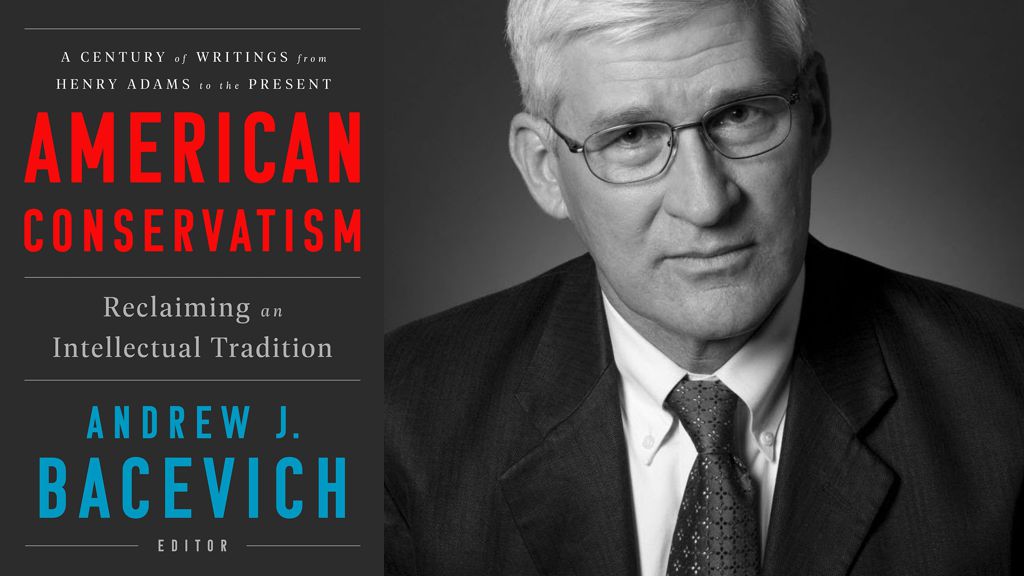As the nation stands at a crossroads, Andrew J. Bacevich urges us to reexamine the ideas and values of the American conservative tradition in American Conservatism: Reclaiming an Intellectual Tradition.
What is American conservatism? What are its core beliefs and values? What answers can it offer to the fundamental questions we face in the twenty-first century about the common good and the meaning of freedom, the responsibilities of citizenship, and America’s proper role in the world?
As libertarians, neoconservatives, Never Trump-ers, and others battle over the label, this landmark collection offers an essential survey of conservative thought in the United States since 1900, highlighting the centrality of four key themes: the importance of tradition and the local, resistance to an ever-expanding state, opposition to the threat of tyranny at home and abroad, and free markets as the key to sustaining individual liberty.
Andrew J. Bacevich’s incisive selections reveal that American conservatism—in his words “more akin to an ethos or a disposition than a fixed ideology”—has hardly been a monolithic entity over the last 120 years, but rather has developed through fierce internal debate about basic political and social propositions. Well-known figures such as Ronald Reagan and William F. Buckley are complemented here by important but less familiar thinkers such as Richard Weaver and Robert Nisbet, as well as writers not of the political right, like Randolph Bourne, Joan Didion, and Reinhold Niebuhr, who have been important influences on conservative thinking.
More relevant than ever, this rich, too often overlooked vein of writing provides essential insights into who Americans are as a people and offers surprising hope, in a time of extreme polarization, for finding common ground. It deserves to be rediscovered by readers of all political persuasions.
Editorial Reviews
Review
One of “7 Books to Watch for in April” in The New York Times
“A valuable collection. . . . Bacevich is not looking for agreement — this is neither an evangelistic credo nor a sort of Conservatism for Dummies. Rather, it is a collection of diverse thinkers generally inclined toward the causes of order and tradition, and the best articles have a solidity that can seem a bracing tonic for the present chaos.” —Tim Page, The Washington Post
“A rich menu. . . . Bacevich’s selections evidence that conservative anxiety about the cultural consequences of modernity has a distinguished American pedigree.”
—George F. Will, The New York Times Book Review
“Eloquent. . . . A collection of essays and speeches—mostly from the 20th century—that argue tacitly that today’s conservatism needs an intellectual reboot.” —Kirkus Reviews
About the Author
Andrew J. Bacevich, editor, is professor emeritus of history and international relations at Boston University. A graduate of both the U.S. Mil- itary Academy and Princeton University, he served in the U.S. Army for twenty-three years. His recent books include The Age of Illusions: How America Squandered Its Cold War Victory, The Limits of Power, and America’s War for the Greater Middle East. His writings have appeared in The New York Times, the London Review of Books, and the American Conservative, among other publications
Excerpt. © Reprinted by permission. All rights reserved.
From the Introduction
The modern American conservative tradition—roughly dating from the dawn of the twentieth century—emerged in reaction to modernity itself. Modernity meant machines, speed, and radical change—taboos lifted, bonds loosened, and, according to Max Weber, “the disenchantment of the world.” It induced, and perhaps required, centralization. States accrued power. Bureaucracies thickened. Banks, corporations, rail systems, and industrial enterprises grew to mammoth proportions. War became more destructive.
Modernity promised liberation and for many did improve the quality of everyday life. Yet it also subjected individuals to immense and only dimly comprehended forces. In exchange for choice, it demanded conformity. Modernity demolished tradition or rendered it irrelevant. What remained of the past might retain interest as artifact but was drained of substantive relevance.
Liberals, progressives, leftists—choose what label you will—have tended to embrace modernity, seeing it, on balance, as a positive force. By comparison, conservatives have typically viewed modernity as a threat, responding to it with a mixture of apprehension, alarm, and horror. This anthology collects in a single volume noteworthy examples of the American conservative critique prompted by the encroachments of modernity.
That said, I am not suggesting that in the long, contentious, at times bitter debate about America’s purpose and destiny, proponents of conservatism have necessarily gotten things right. The issues being contested are too complex to allow for reductive judgments of right or wrong, good or bad. Yet in the crisis that has enveloped twenty-firstcentury America—a crisis made starkly manifest by Donald Trump’s election as U.S. president in 2016—conservative principles deserve a second look, even, or especially, from those who bridle at the very use of the term.
Skeptics might respond that Americans today already have more than ample exposure to conservative perspectives, whether coming directly from Trump’s White House, from megaphone-wielding House and Senate Republicans, or from outlets such as FoxNews, AM talk radio, and right-wing websites. Yet all of these qualify as conservative only in the sense that blue-chip recruits at a football factory qualify as “student-athletes.” Any resemblance to the real article is superficial and manufactured.
Donald Trump is not a conservative. Nor are the leaders of the Republican Party over which Trump presides. Prominent GOP figures such as Kentucky senator Mitch McConnell seem to adhere to no worldview worthy of the name. As for the provocateurs who inhabit the sprawling universe of rightwing media, their principal motive is not to promote genuine conservative values but to rabble-rouse and line their own pockets. Indeed, allowing Trump, McConnell, Sean Hannity, Laura Ingraham, Rush Limbaugh et al. to present themselves as exemplary conservatives testifies to the pervasive corruption of contemporary American political discourse.
So except among the multitudes who sport MAGA hats and look to the likes of Sean, Laura, and Rush for instruction, the conservative brand has of late been badly tarnished and even degraded. As a result, conservatism today has become synonymous with meanness, bigotry, and retrograde attitudes. The contents of this book suggest that this condescending characterization is wildly off the mark.






